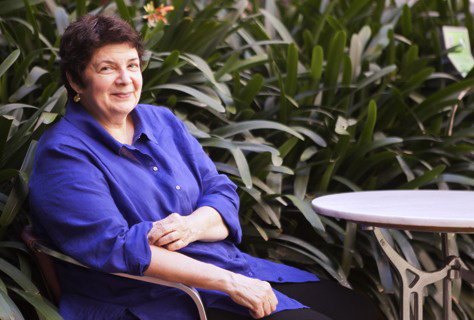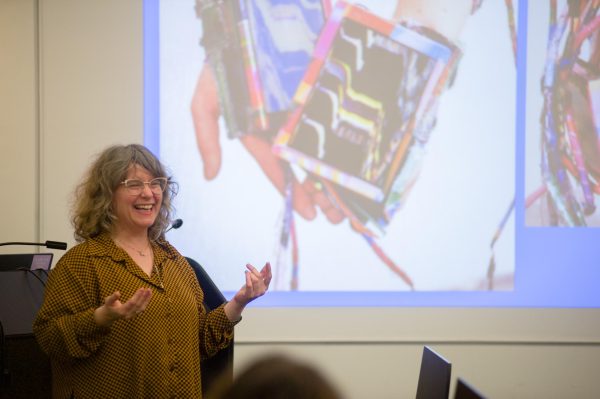Mary Ann Newman, Translator

Photo courtesy of Mary Ann Newman
Mary Ann Newman, translator and keynote speaker for the 2018 Student Translation Symposium.
Acclaimed translator Mary Ann Newman is the executive director of the Farragut Fund for Catalan Culture in the U.S., co-chair of the PEN Translation Committee, a board member of the Catalan Institue of America, and a member of the North American Catalan Society. She translates from Catalan and Spanish and has published works by Quim Monzó, Xavier Rubert de Ventós, Josep Carner, and Josep Maria de Sagarra. She was awarded the Creu de Sant Jordi in 1998 and the 2017 North American Catalan Society prize for her translation of de Sagarra’s novel Private Life. Newman visited Oberlin this week as the keynote speaker for the annual Student Translation Symposium. She gave her talk, “In Praise of Borders (Not Walls),” Tuesday afternoon in Craig Lecture Hall.
This interview has been edited for length and clarity.
How did you get interested in translation in general, and in translating from Spanish and Catalan in particular?
I think that there are some people who are vocational translators, and when I was 18 — in my first semester in college, I think — I read the first poem I understood completely. It was one of the 20 love poems of Pablo Neruda, and I thought it was so beautiful that my immediate impulse was to translate it so that my mother could read it — my mother and my aunt were in the house. I think, for some people, there’s an impulse to share that’s intrinsic to translation.
Are there any specific challenges that Catalan and Spanish present linguistically, or characteristics of them that shape your work?
I’ve translated more from Catalan literature. My one published work in Spanish is an essay. I think there are the challenges of the marketplace, and then there are the challenges of the text, right? Spanish, on one hand, is an omnipresent language in the United States. On the other hand, it’s undervalued. You had the Latin American boom in the ’60s and ’70s, and now texts continue to be translated, but don’t have the same effect on literature. That kind of special invisibility of Spanish where it’s always there, not seen and not valued, is one of the challenges.
And for Catalan, of course, it’s the utter invisibility — until recently, you had to explain what Catalan was. The first book I translated from Catalan — the publisher was very smart, and on the front cover it says, “The Catalan culture is one of the world’s richest. It has given us the art of Dalí, Caballe, Miró, Gaudí, and Casas.” … It was the only way to give context.
Spanish has that very beautiful romance rhythm, but that can be limiting when one is translating. Catalan is interesting because it has more edges. It has a lot of monosyllables, it has words that end in consonants — it’s very, very beautiful, but it has a somewhat more staccato sound. That makes it fun to translate into English, because English has those elements as well. I find that it allows me to play with the sounds of English as an equivalent to the Catalan, whereas in Spanish, the sound of Spanish is much more mellifluous than the English.
Translation has been framed by a few theorists as this negotiation between the two poles of either “domesticating” the original language or “foreignizing” the target language. How do you strike that balance, and how do you make choices about what unfamiliar elements of a text to preserve?
There’s a personal translation practice that I have on one hand, and then there’s the question of reception. As my practice, I think that if you hew closely to some aspects of the text, you bring out the foreignness. If you can transmit the literal notes of the foreign language, there is already a lot of foreignness, and you’re kind of bursting the seams of English by telling that. When I translated Private Life — Private Life is a love letter to Barcelona, and the author kind of traces the map of Barcelona — I just radically use all of the street names, and the titles. … I think one critic said that it felt like it was a very muscular translation, like a transcription from Catalan. In terms of reception, I’m doing a round table at the World Voices Festival; it’s called “Translation and the Power(s) of Language,” talking about the places where there is a bilingualism and a power relationship between the two languages. I have two questions. One is, “How do you decide what language to write in, and what is your relationship to the other language?” And the second is, “How does translation affect that?” For example, if you’re translating into English, French, or Greek, does translation even out the playing field? Does it [put a] Catalan or Guinean text on more equal footing with other literary traditions? On the other hand, does translating it into a major language erase the difference? I think both of those things are true.
You wrote that translation is a way to discover our commonalities and our differences. What specific commonalities and differences are there between English and Catalan or Spanish that are especially compelling to you, as languages or as cultures?
You know, Catalans are reading English, always. The thing about being in a minoritized language … is that you always know more about the others than the others know about you. And that’s less true of Spanish. It’s partially true of Spanish. But it’s interesting. One of the interesting problems of Spanish is that it’s also hard for people to read one another. Spanish is not necessarily a common language in literary terms — I mean, of course, the great Latin American writers and the great Spanish writers are reading one another, and the boom writers, for example, were very aware that they represented a generation that was Latin America. I feel as though that’s much more fragmented now. Mexican writers are being read by Mexican readers. And in Catalan and in Spanish, being translated into English is one of the things that makes them be read by other people of the same language. For example, Peter Bush translated a Catalan civil war novel, Uncertain Glory. It got a lot of press in the U.K. and was considered one of the 10 best books of the year by The Economist, and it created a boom in people who hadn’t read Uncertain Glory in Catalan. Suddenly, it became a bestseller in Catalonia because of a kind of reflected glory. I think those things are interesting to look at.
Could you talk about the theme of your keynote address for the Translation Symposium on Tuesday afternoon, and what borders mean to you?
I think borders are porous, and I think they’re a stimulus. If you’re not being kept out — if a border is simply a signpost — then there’s a certain kind of excitement. I think even something as silly as going from “You are now leaving New York/You are now entering Vermont,” you say, “Oh, look!” We are passing into some other place. I think a border can tell you where you are, and I think that that’s a useful thing. It doesn’t necessarily mean that there’s power. One of the things [I’m going to do] is read a little bit of a poem by Wislawa Szymborska that’s about the futility of borders in terms of dust or clouds or ants, or anything having to do with nature. She concludes that only the human has difference. I think the border shows us, in a way, where we’re human. I have a hopeful interpretation. I mean, I think that a border that has barbed wire and is meant to keep people out — that’s a wall. And it doesn’t keep people out, but it hurts them. … I’m not saying that they’re not places of danger. I just think that there’s another way of looking at them.
Do you see your work as situated in any specific way in relation to Catalan nationalism?
Yeah, I guess. I think, you know, the funny unintended consequence of the Catalan crisis is that now people know where Catalonia is and what it’s about. I used to say that I do Catalan literature, and people would say “Huh?” I’d explain it. Now, I say that I’m a Catalanist, and they say “Really? Oh, tell me.” I think, curiously, the crisis has given visibility to Catalonia as a culture or as a politic. … My translation used to be sort of a voice crying in the desert, and now the conflict had been internationalized, and my work is maybe being swept up on the wave.
Do you think that some degree of identification with a text is necessary in order to translate it well?
Well, I have only translated things that I love to translate — it’s one of the privileges I allow myself. But, for example — in [a book that I worked on], there are instances of antisemitism and homophobia that I don’t feel comfortable with. But they are attitudes from the period, so I just think it’s important for people to know. I mean, there are things like that in Tolstoy as well. And that kind of thing gives you an understanding of the author and his intentional acts, the value of the text. But I prefer to feel some kind of devotion to the writer or the writing. Having said that, I made a decision that translation was not going to be my living, so I can — by making a living doing other things, I can afford to translate only the things I want to.
One thing that struck me about your translations, especially of Maria Cabrera, was your ability to create unusual and innovative syntax in English. How do you approach the translation of phrases whose structures are experimental in the original?
There’s a lot of instinct involved. I think the good thing about getting old and doing this for many, many years is that there’s a level of comprehension. I think it’s really interesting that you’ve looked at the syntax, because what I try to do is convey the foreignness of the text by reproducing as much of the syntax of the romance language as I can in English. And I think old-fashioned translations used to do that, I mean, I think people used to do that a lot more. On the other hand, I make the syntax close, but I try to use the most colloquial lexicon. So, maybe there’s a tension — that’s one of the interesting things is [that] there’s a tension between, I hope, a modern language and a hewing to the romance syntax.
You’ve written about the gendered nature of translation in our cultural consciousness: the figure of the translator as a seductive, unfaithful woman.
That’s something I speak against. That is the position. The translator as unfaithful, and hence gendered as “la donna è mobile.”
As a woman translator, do these kinds of images impact your own relationship to your work?
No, because I believe that’s erroneous. I think the translator is shuttling back and forth between the two languages, trying to maintain faith with both of them, and is a kind of diplomat. In any case, if there’s a lack of faith, it’s not a bad faith. It’s doing it in good faith.
I think there are few professions that are more idealistic and utopian than that of the translator, which is why I see borders as kind of fuzzy.
Do you have any advice to aspiring translators?
Make sure the rights are available. It was really thrilling to be at the symposium [Monday night], because I think all of you know what you’re doing and have very definite ideas. But the only advice is in terms of if you really want to make a living as a translator. There are some people who move to a country where the cost of living is lower — I know people who live in Mexico and Spain for that reason. Another way to be a translator is to be an academic. But of course, that was a problem for a long time, because translations were not considered to add to the curriculum of an academic.
Having said that, translation is entering into a period of crisis. It’s had about 10 years of looking like translation was becoming a part of the American publishing scene, because there was money from foreign institutions, there were grants for translations, there were a lot of small independent publishers arising who were devoting their work to translation. And it seemed like there was a little ecosystem that was functioning, but it turned out that the profit margin for publishers, for these small publishers, is so small that a lot of them may not survive. So when translators are taking a stand, and saying we need to be valued, the publishers are in a very untenable position. Because if they can’t survive, then the translators will have nothing to translate.









